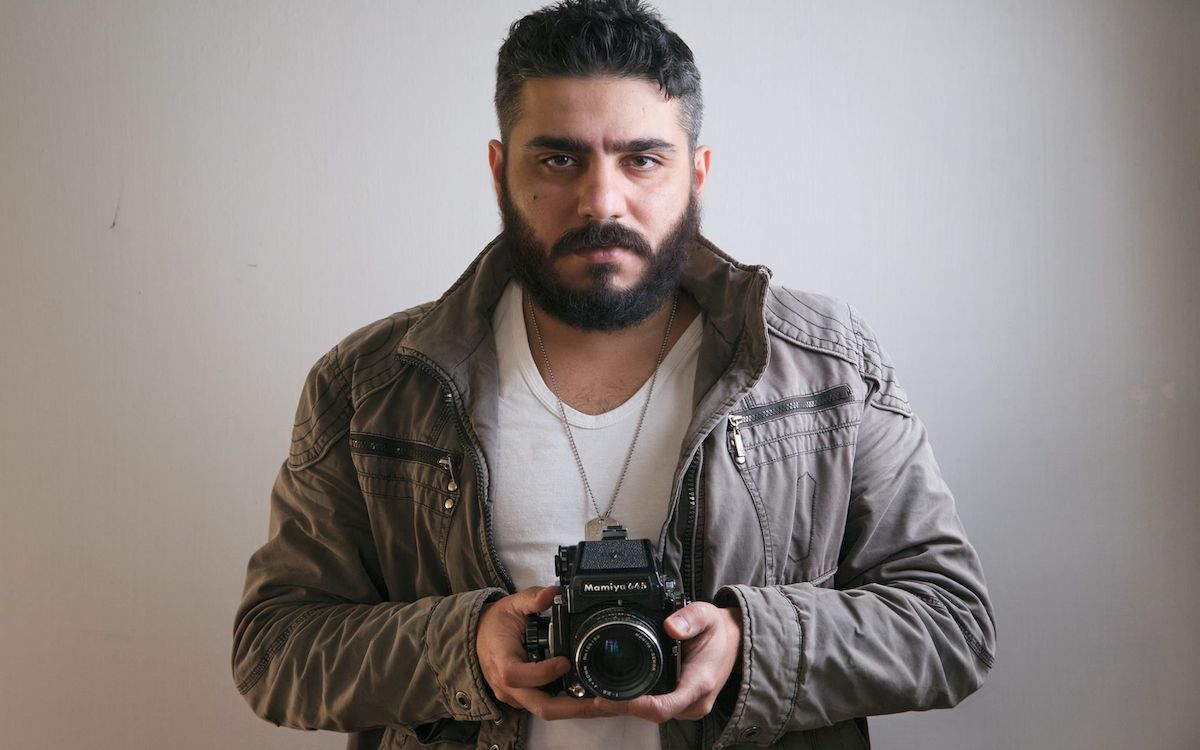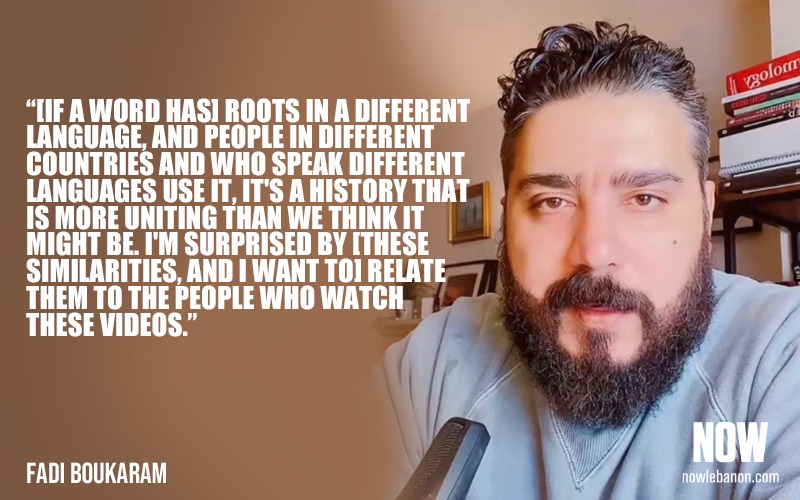
When Lebanese photographer Fadi Boukaram found himself trapped at home in Dublin, Ireland during the COVID-19 pandemic due to strict lockdowns in 2020, he started making videos – mostly to entertain himself. However, his observations on the origins of Arabic dialects and loan words quickly found a viral following among his fellow Lebanese on social media, skyrocketing in popularity.
“I’ve always loved languages and linguistics, but it’s not something that I’ve ever talked about,” Boukaram told NOW. “I’ve never done videos before, but – during the pandemic – something clicked; let me talk about something and maybe someone would be interested. I started on TikTok [and] people started sharing [my videos]. I started posting on Instagram this year. For some reason, the account took off.”
“It’s mostly about trying to find commonalities between different languages,” he added. “[If a word has] roots in a different language, and people in different countries and who speak different languages use it, it’s a history that is more uniting than we think it might be. I’m surprised by [these similarities, and I want to] relate them to the people who watch these videos.”

A road trip through Lebanons
Having left his previous job as a computer engineer in 2016, Boukaram primarily works as a street photographer, with a side job in documentary photography. Following something of a pattern, what was once just a hobby became a passion project that would lead to something more.
This newfound vocation, combined with a love for history, took Boukaram across the United States not once, but twice, documenting all the towns called ‘Lebanon’ throughout North America.
“The first trip happened to start in the fall of 2016,” he recalls. “I was in the middle of the country when Donald Trump was elected,” he said. “I felt like this was an opportunity to talk to people from all different walks of life over there.”
This visit took an unusual turn when Boukaram began to notice something strange about the ‘cedar’ trees that several of these towns were very proudly showing off. Whatever they were, they were definitely not Lebanese cedars, and the origin of these imposter trees immediately captured Boukaram’s interest.
Through his own research, he discovered that in 1955, several mayors of these American ‘Lebanon’ towns came to their homes’ namesake as part of a visit arranged by the American Friends of the Middle East. However, the person who came to Lebanon with these mayors – who was meant to take care of the saplings and bring them back to Lebanon, Nebraska – was mysteriously killed on the border between Israel and Jordan, shot in no-man’s land by the Jordanian Guards.
“They were saying that he was trying to pass information to the Israelis,” says Boukaram. “His body is still in Ramallah, because the US State Department refused to expatriate his body.”
The cedar trees were then sent to a different city, Lebanon, Ohio, where – unfortunately – nobody knew how to take care of the trees. Of seven saplings, only one survived. Rather than admit to the other towns that they had killed their trees, they instead sent juniper trees in their place; a ruse that persisted unchallenged for 60 years until Boukaram’s visit.
This strange tale would end up becoming very personal to him the next year, when he was contacted again by the residents of Lebanon, Nebraska.
“[They] emailed me that there had been a storm; their tree got split in half [and] could I replace it?” Boukaram stated. “That [became] the subject of my second trip; planting cedars.”
A fascination with words
This inquisitive nature and fascination with hidden history makes Boukaram the perfect curious linguist, although he is the first to admit that he is no expert.
“This is strictly at an amateur level,” he insisted. “It’s not like I’m discovering something that linguists who study Arabic would be surprised by, but – given that their work is mostly in scientific or academic journals – it’s not [common knowledge] to the general public.”
“When I made videos on the original names of fruits in Arabic, I was taken by surprise,” he said. “I had no idea that, in 2023, people don’t know the origin of ‘akedenia’, the loquat fruit in English, or the greengage plum, ‘janerik’. These come from Turkish, so – in my mind – someone must know about it, but the way these videos went viral, there were a lot of people who didn’t.”
The long history of Turkish influence in the Levant – brought about by the presence of the Ottoman Empire and its occupation of various Arab territories – has resulted in a large number of Turkish words being adopted into the Arabic dialects of the region, such as those of the Lebanese, in particular in the northern areas such as Tripoli and Akkar, Syrians and Jordanians.
View this post on Instagram
The Levant has always had its own languages and dialects that are highly distinct from other Arab countries. While differences can arise from many factors – the dialects of Egypt, Iraq, Morocco, Tunisia or the Gulf Peninsula are all radically different from one another – the prevalence of Turkish words is much more pronounced in this region than others, leading to some curious adoptions that are very unique to the area.
“The Ottomans borrowed a lot from Arabic, and then – through the presence of the Ottomans around our region – we took words from them,” Boukaram explained. “The word for ice cream in Lebanon is ‘bouza’; that word is just the Turkish ‘bouz’ that means ‘ice’. In other Arab countries, they would not use that word. They would use the word ‘ice cream’ or ‘gelato’, or another transliterated word, whereas – for us – it’s straight from Turkish.”
“Linguistically, Arabic and Turkish are as far apart as can be; the same distance as Arabic and English or Turkish and English,” he stated. “They are completely unrelated, but there is so much intermixing historically – [thanks to the] Ottoman Empire – that it’s sometimes hard to [determine] the origin of a word.”
“There’s a word we use in Lebanon and Syria – ‘doumareh’ – which means [person], but we don’t know the origin,” he continued. “I still don’t know the origin, but I’ve been researching that word because I’m interested in it, and looking into Arabic resources and newspapers. They are repeating stuff that is obviously unsourced. Everyone says it’s a Turkish word; not a single one of them is saying what this damn Turkish word that it’s coming from is!”
This difficulty of tracing the origin of particular words is one that Boukaram has often encountered during his own investigations. While languages like English or French are extremely well-documented, often requiring little more than a Google search to find a detailed origin of a term, the same simply cannot be said of Arabic.
“Whenever I want to do research on Arabic words, it’s not easy to find resources,” Boukaram said. “You have to read a lot of linguistic papers, hoping to find some indication of the origin of the word.”
“Etymology as a science is predominantly an Indo-European thing, as in the Indo-European languages,” he added. “Aramaic and Hebrew are the two languages that are closest to Arabic; politically [and] historically speaking, you can understand why there wouldn’t have been that much of an interest – locally – to do work on that.”
Despite the challenges, Boukaram’s simple goal of sharing the interesting things that he discovers, in the hope that his audience will enjoy them as much as he does, appears to be vindicated by the keen following he has amassed. We can only look forward to what else he can tell us.
Robert McKelvey is a multimedia journalist with @NOW_leb. He tweets @RCMcKelvey.







